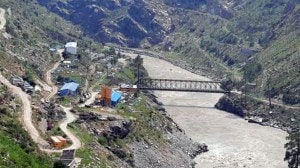Explained Ideas: What ails with the draft EIA notification 2020?
Draft EIA Notification 2020 dilutes environmental protections and is in denial of ecological crises, writes Shibani Ghosh.
 At Pandavkada waterfall in Kharghar, Navi Mumbai. (Express Photo: Narendra Vaskar)
At Pandavkada waterfall in Kharghar, Navi Mumbai. (Express Photo: Narendra Vaskar)The draft EIA Notification 2020 proposed by the Ministry of Environment, Forest and Climate Change has met with massive opposition. This is not surprising, according to Shibani Ghosh, fellow, Centre for Policy Research, and Advocate-on-Record, Supreme Court.
“The stakes for the environment — and people — are staggeringly high. There is a crying need to overhaul the environmental clearance system. But the Ministry’s proposal perpetuates the faults and weaknesses of the current EIA Notification 2006, dilutes it further in some respects, and fails to acknowledge the grave ecological crises that the country is facing,” writes Shibani in her opinion piece in The Indian Express.
She gives five reasons for holding this view and demanding its withdrawal.
One, the draft notification is legally untenable as it does not conform to its parent Act — the Environment (Protection) Act 1986. The Act requires the Centre to take measures to protect and improve the environment. “By reducing the ambit and stringency of the scrutiny of impact assessment, the proposed regulatory processes will prove severely detrimental to the environment,” she states.
Two, the proposed mechanism to deal with violations is illegal and worrying. “…the proposed notification allows the government to grant an ex post facto environmental clearance to projects that have commenced illegally without a clearance,” she points out.
Three, there is no mention of climate change and related consideration.
Four, the draft undermines procedural environmental rights. “The public consultation processes currently in force under the EIA Notification 2006 are already unsatisfactory, but the draft notification curtails their scope further”. It also reduces access to relevant information for project-affected persons.
Five, there is no effort to put in place processes that will improve the quality of decision making, particularly of the expert appraisal committees which perform the critical function of independent evaluation of projects.
Also in Explained | Breaking down GST: slabs, payments, dispute
- 01
- 02
- 03
- 04
- 05






































